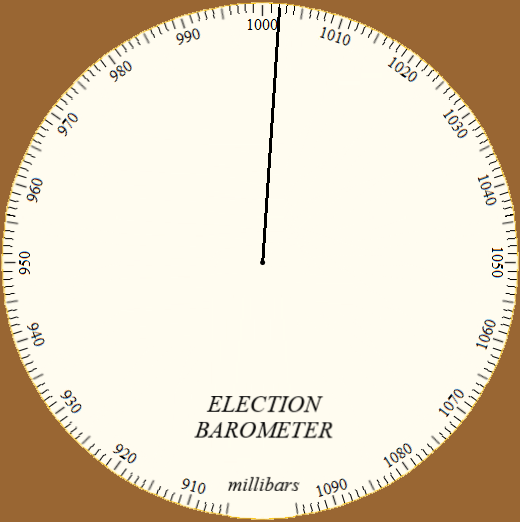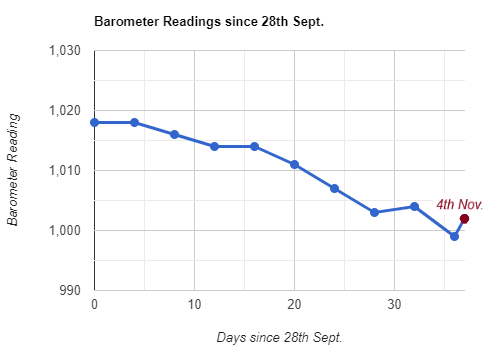METHODOLOGY
While this barometer might be accurate in measuring which candidate (if any) the election is swinging towards at any given moment, the barometer may not be able to tell which candidate is actually winning, nor by how much. Let me explain how my barometer works.
First, the candidate of the incumbent President's party is positioned on the right side of the barometer, and the non-incumbent 'challenger' candidate is positioned on the left side. So, any increase in the barometer reading indicates a positive change for the incumbent party candidate, and a decrease benefits their opponent.
I have used the data aggregated by FiveThirtyEight because not only do they find an average of multiple polls, but the aggregate weights the outcomes of the polls according to how trustworthy and reliable the pollster is, and according to the recency of the poll.
On the barometer, a change of ten millibars is equivalent to a swing of one percentage point in the polling aggregate. So if Harris was leading by 1.2 pp, and then eight days later, Trump leads by 0.3 pp, then that is a total swing of 1.5 pp towards Trump across eight days, and the barometer would move down by 15 mb after the eight days.
This explains how the barometer reading changes alongside movement in the polls, but now let me explain how it lands on a specific reading. There are questions around how the popular vote will relate to the likelihood of winning a majority of the electoral college (what ultimately determines the winner), and some have said that Harris will need to win by at least 3 percentage points in the popular vote to win the Presidency. I use this benchmark of 3 pp. This would suggest that if she had a polling lead of 1.5 pp going into election day, and if the polls were completely accurate, then she would lose, because her winning the popular vote by 1.5 pp would (supposedly) not be enough to correspond to winning in the electoral college.
However, the polls are not the only thing that should be considered when predicting election results. One factor is Trump's outperformace of the polls in 2016 and 2020; the possibility that he outperforms the current polls by a similar margin (around 2 to 4 pp nationally) should be considered.
However, there are structural features of this election which should benefit Harris. One is the non-polling metrics - the so-called 'fundamentals' - such as the economy. Despite high inflation during Biden's term, the economic metrics are generally strong, and this usually helps the incumbent party candidate.
Although abortion is not the most important issue to voters overall, its newfound salience after the 2022 Dobbs v. Jackson ruling has seemed to be a reliable booster for Democratic votes. The Democrats campaigned on this issue in the 2022 midterms, and successfully avoided the Republican 'red wave'. It seems likely that, to some degree, the issue of abortion rights will help Harris, and hurt Trump, whose tightrope-walking on the issue has already produced disquiet in pro-life ranks. Perhaps this will directly cost Trump some pro-life votes, as well as benefiting Harris.
Considering the three factors of Trump outperforming the polls, the fundamentals, and the issue of abortion rights, the latter two should benefit Harris, while it is hard to know whether Trump will outperform the polls, and if so, by how much. Whether Trump outperforms the polls is another question, especially since pollsters have already been attempting to correct for this. So, on balance, it looks like there are structural reasons in this election for why Harris 'should' ultimately win.
So, I have given Harris a 20 mb initial boost ahead of the polls, which corresponds to 2 pp. However, she would have to be ahead by at least 3 pp in an accurate aggregation of polls, satisfying our benchmark from earlier, to win against Trump. So, if she was only leading by 2 pp nationally, she would be 1 pp behind where she would need to be to beat Trump, leaving her 10 mb out from victory - but then adding the 20 mb 'boost' swing in her favour means she would ultimately be in winning territory by 10 mb.
We can use the following formula to find the barometer reading. The 3 pp benchmark is used to align the polling lead with an electoral college outcome, and the 20 mb boost for Harris considers the balance of the structural factors at play in this election. So, where C1 is the weighted polling aggregate average for the incumbent party candidate, and where C2 is the same for the non-incumbent party candidate:
Reading = 1000 + ((C1 - C2) * 10) - 30 + 20
Or, equivalently:
Reading = 990 + ((C1 - C2) * 10)
So, according to the barometer's current predictive model for the 2024 election, the incumbent candidate, Harris, will win the Presidency, so long as her national poll lead is at or above 1 pp, and if it falls below 1 pp, then Trump's outperformance of the polls in the real popular vote would be sufficient for a Trump victory in the electoral college.
The magnitude of the 20 mb boost is somewhat arbitrary, but given the benchmark of a 3 pp lead in the popular vote for a Democratic candidate to beat Donald Trump, I am giving Harris the 20 mb boost since it is effectively me saying that I believe Harris would win, whatever the polls are saying, up to the point where her lead drops below a single percentage point, in which case I suspect it is just more likely that Trump would win the Presidency. This boost could change depending on the election year, or on a re-evaluation of the dynamics of the election, since the magnitude of the boost (towards either candidate) is informed by the circumstances contingent to that election.
I cannot pretend that my methodology is scientific, or even necessarily worth listening to; better models are much more informed, and I have neither the time nor the expertise to devise a more credible predictive model. Thank you for reading the scientific non-science of my methodology, and we will just have to wait and see how the election goes, and which predictive model comes closest.

